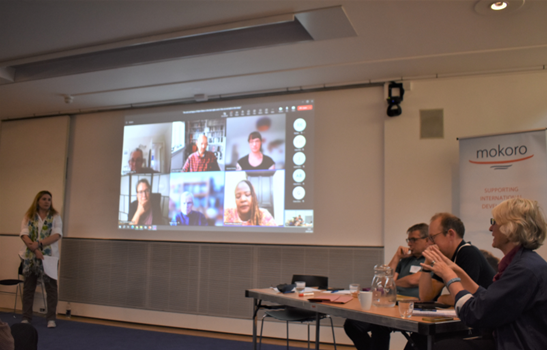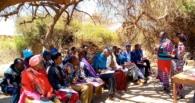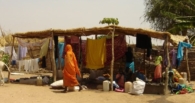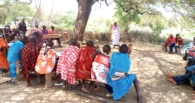The work and legacy of Robin Palmer
How can we build on this today?
Sarah Candy
1 August 2023
/
- 0 Comments

The seminar took contributions from speakers and audience members both in-person and virtually.
Following the passing of Robin Palmer in February 2023, Mokoro organised a seminar that paid tribute to Robin’s pioneering work within the land rights sector. On the 3rd of July 2023, 40 people gathered at the Ashmolean Museum in Oxford and 20 online to join this tribute to Robin, to look back at how the land rights sector has changed over the time span of his career and discuss the impact that his work made. Elizabeth Daley chaired the hybrid seminar that featured colleagues and friends of Robin.
Camilla Toulmin met Robin in the mid-1990s when an awareness was growing that land rights had been largely neglected. Robin was instrumental in highlighting the gap between what the law says and the reality on the ground. A dichotomy that was exacerbated by the increased pressure that already weak land rights structures were coming under from rising demographics and growing cities. We can see that there is still a long way to go as countries are passing progressive legislation, but there is very little practical change to accompany the legal reform. Pressure on land has tightened further with contemporary forms of land grabbing: lithium mining, special economic zones, carbon offsetting. Limited effort has been made to increase awareness of new laws, and pastoral land rights are particularly weak. We need to go back Robin’s wisdom: law will stay on paper until we find ways for practical action.
Sibongile Ndashe joined online to speak about the mentorship of Robin when she was a lawyer working for a feminist organisation in 2003. Robin took every opportunity to learn, to listen and was fascinated with how to translate laws into tangible change. He had a special skill of creating spaces for people to convene and discuss and as such, was instrumental in creating a women’s land rights community that thrived. Robin created a space for women’s land rights advocates to engage with academics and ensured that everyone’s engagement was important so that they continued to contribute. Robin’s legacy is about intentionally creating the spaces for young people to be inspired to drive change.
Max Lawson first worked with Robin at Oxfam when the team were working on food security projects in Malawi. There was a realisation that farming techniques alone would not help when people were trying to survive on very small portions of land. Robin’s visit changed Max’s life in some ways, helping to situate the work in colonial history and Max fell in love with the history of frontline states and anti-Apartheid struggles. Robin helped to keep Oxfam as radical as possible, and his determination to change the world created an environment for others to do so too.
Three videos were shared from Esther Obaikol, Prosper Matondi and Birgit Englert. All three spoke affectionately and admirably about how their work has been shaped by the writings and mentorship of Robin. Robin has given many others the information to withstand the pressure from large scale land acquisitions which contrasts with his humility for someone who was such a powerful force to be reckoned with.
Finally, Ian Scoones spoke of Robin the scholar-activist: linking research and scholarship with policy in action. He taught others to do the same. Robin’s books that are so influential for land rights actors are detailed and analytical, but they are also passionate and political, just like Robin himself. They are written from his lived experience. They help others to understand the deep brutality of colonial rule and the power struggle over land. Robin was one of the rare people to connect academia and development activists. Ian summarised the view of all the speakers as he spoke of Robin as a mentor, as someone who created spaces to convene and discuss, Robin’s insistence that research is innately always political. He had a skill for connecting historical scholarship with contemporary debate, and one of Robin’s greatest legacies was his labour of love, the hugely valuable resource, the Lands Rights in Africa website.
The discussion concluded with exploring what areas within the land rights sector remain to be addressed, and that there is clearly work to be done to move land debate from it’s current state of marginalisation, into the mainstream political and policy sphere. But Robin’s work, the legacy of his writings, and multiple generations of land activists that he mentored has laid a strong foundation for further change.
A download of this article, plus some accompanying quotes from the speakers can be found here.



